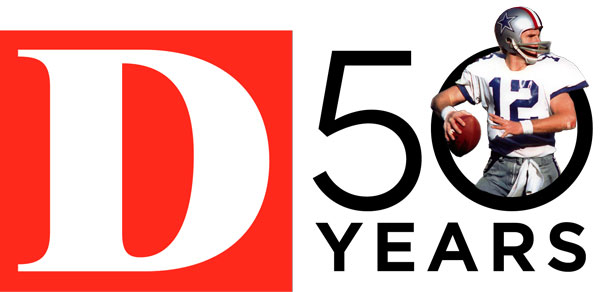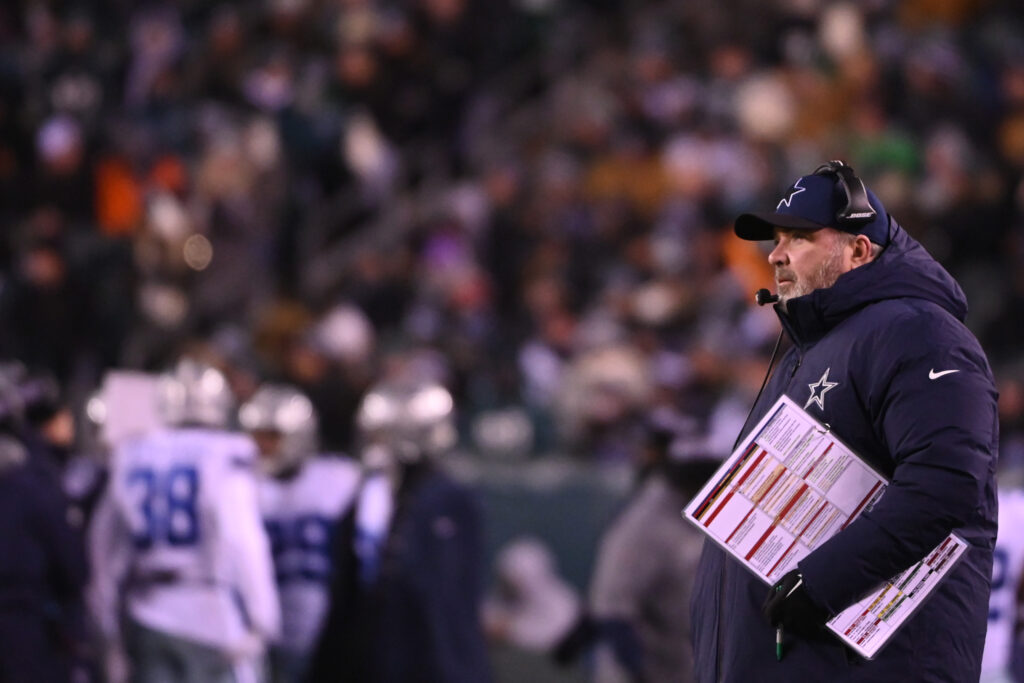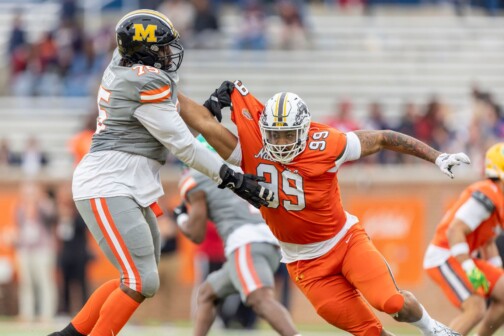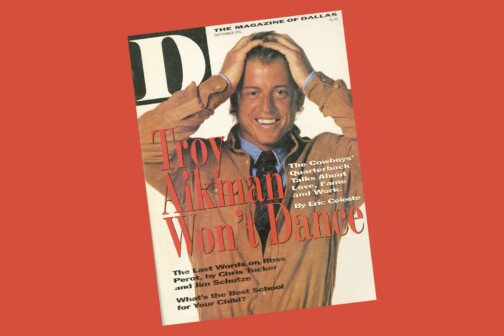The Cowboys’ season is over after Dallas lost 23-17 to the San Francisco 49ers. What got accomplished? Not much worth celebrating. Still, let’s run it down one last time.
Collapsed. Again. ✓
This was what the money was for, so that Mike McCarthy could stamp out the sour aftertaste of playoff failure, the flavor of a generation of Dallas Cowboys football.
In this respect, McCarthy is no different from Jason Garrett or Wade Phillips or Chan Gailey or Bill Parcells or Dave Campo. All six were recruited to chase the ghost of Barry Switzer, Dallas’ last Super Bowl-winning head coach, whose own Cowboys tenure was a mostly failed attempt to measure up to Jimmy Johnson. Twenty-six years later, none of them have caught up to it.
Where McCarthy differs is perception. His allure to the Cowboys lies in an aura that doesn’t suggest he could succeed where his predecessors failed so much as he should. No one since Johnson himself owes more of his job to cold, utilitarian success. McCarthy has won a Super Bowl before and therefore he can win again. So the thinking goes. Never mind that no head coach has ever done that for two franchises or that it remains hazy how much credit he deserves for that title with the Green Bay Packers when Aaron Rodgers, among the best quarterbacks to ever breathe, was at the controls.
Because what else is he known for? Offense, predominantly, except, be it McCarthy’s choice or the front office’s, Kellen Moore calls the plays. Aside from that? Unlike Parcells, McCarthy is less a builder than a remodeler, taking over in Green Bay one season after Mike Sherman’s run of four consecutive seasons of double-digit wins ended and landing in Dallas a season removed from Jason Garrett winning three division titles in five years. His enduring motivational ploys deal more in slapstick—smashing watermelons with a hammer, Austin Powers bits in training camp, bringing national awareness to something called Anti Monkey Butt Powder—than awe inspiring, and so, fairly or not, no one trumpets him as a leader of men. By now you know he is hardly a master tactician, either, prone to bungled clock management, fourth-down waffling, and bizarre gambits.
But McCarthy is here for days like Sunday, to marshal a football team through the harsh postseason winters. To guide them. To do the one thing a résumé so deeply rooted in outcomes demands from a coach whose process has never totally added up: win.
The Cowboys didn’t, and there is no shortage of blame to parcel out. This was an archetypal Cowboys meltdown, devastating and exhausting and more than a touch absurd. Which is bigger than McCarthy. We’ve watched versions of this for the better part of three decades; it’s why this franchise now owns the longest streak of playoff appearances without making a conference championship game since 1970. Yet why is McCarthy in Dallas if not to save the Cowboys from themselves?
There is little point in rehashing each moment of Sunday’s defeat, in raking psyches over the coals again, because so many of the failures—the refs and the stadium architecture, the blown tackles and whiffs in coverage, the play calls and the clock—were ornamental. Everything ultimately comes back to McCarthy: his shortcomings and his inability to elevate this team beyond them.
For as much consternation as the final 20 seconds caused, this game was lost in the first quarter. San Francisco stormed out of the gate with a touchdown drive featuring four consecutive plays of 10 or more yards. Dallas, owners of the most prolific offense in football, didn’t manage a play with positive yardage until 4:35 remained in the first quarter. Their first play in opposing territory came with 8:00 remaining in the second. The damage after the first 15 minutes looked like this:
First quarter went about as poorly as possible for the Cowboys, down 10-0.
— Jon Machota (@jonmachota) January 16, 2022
First downs: 49ers 9, Cowboys 1
Total yards: 49ers 112, Cowboys 7
Time of possession: 49ers 11:18, Cowboys 3:42
Some of this evened out as the game went on, but the conclusion had already been reached: the Cowboys were getting out-coached. What else could be said when the 49ers arrived with well-established tendencies to use motion, in-breaking pass routes, and hard runs up the middle—and then slashed the Cowboys apart with all three? Meanwhile, San Francisco was the worst team in football at defending deep passes, yet the Cowboys rarely challenged them downfield. Ezekiel Elliott, playing with what we now know was a partially torn PCL, carried the ball three times as often as Tony Pollard, repeatedly getting slammed into the league’s second-best run defense like a sledgehammer into a steel door.
Perhaps the tactical weakness could have been overcome had the Cowboys been mentally prepared. Micah Parsons admitted they were “flat”; it was obvious. So was the lack of mental preparation when the NFL’s most penalized team in the regular season picked up a franchise-record-tying 14 flags Sunday, routinely crippling their own drives while extending San Francisco’s. After the game, the team once again griped about officiating. That’s coaching, too.
That is the macro view. The micro is just as damning, from the crucial drive-killing pass lost in the sun in the second quarter to the premature white flag punt on 4th-and-2 in the third quarter to the decisive end-game failure, which resulted from poor clock management and Dak Prescott‘s bad judgment, not a screwup by the officials.
There is a reason, as ESPN’s Todd Archer pointed out, that Dallas was one of only two playoff teams that didn’t overcome a double-digit deficit this season despite fielding its most complete roster in years. “When you get this combination of players together, you need to have success,” Jerry Jones told the media postgame, yet the longer the season dragged, the more unlikely success seemed. The Cowboys were at their worst during the time of year that matters most, the offense growing overmatched just as the defense’s absurd early season turnover luck normalized. They wilted, the very thing the head coach was brought in to prevent.
McCarthy is two years into a five-year deal and almost certainly returning. Jones deflected any thought to the contrary after the game. Now, more than ever in McCarthy’s tenure, it’s time to wonder how much positive change is coming under the watch of someone with such proven deficiencies. It will take another season of waiting to see if the answer can be any different next year.
Experienced a wardrobe malfunction ✓
This was probably the first omen that things were destined to go off the rails:
Leighton Vander Esch's name is misspelled on his jersey 🧐 pic.twitter.com/IwU1kHhAXi
— The Sporting News (@sportingnews) January 16, 2022
Vander Esch is an impending free agent who figures to be fairly low on the Cowboys’ list of priorities, which means his final football memory in Dallas might be falling flat in a jersey that butchered his surname. Credit where it’s due: he did make a play to keep the Cowboys’ hopes alive late in the fourth quarter.
Leighton Vander Esch with a huge stop on 3rd down to give the #Cowboys a chance #DallasCowboys
— Matty B (@mattthew_jordan) January 17, 2022
pic.twitter.com/NfKjKvWBXj
Like so much else, it wasn’t enough. But it’s a much better swan song than a butchered jersey.
Received some brotherly love ✓
Stefon Diggs spent Saturday night catching passes for the Buffalo Bills in their 47-17 shellacking of the New England Patriots. On Sunday, he was in the AT&T Stadium stands watching his younger brother, Trevon, play his first career playoff game:
Big Cowboys guy pic.twitter.com/4zKig0X4MV
— Dallas Texas TV (@DallasTexasTV) January 16, 2022
A rare feel-good moment amid the carnage.
Threw down the hammer ✓
Elliott isn’t the player he was two years ago, to say nothing of the player he was entering the league. His legs are heavier, his cuts less explosive. Pollard, Elliott’s much lower-compensated backup, is now better than he is at many aspects of playing running back.
But Zeke still gets his, and if his 26-year-old body is less able, his mind remains willing. Sunday was Elliott in the late autumn of his career, far closer to the end than the beginning but not finished quite yet. We saw it in two wobbly runs on toss sweeps to the left—a should-be Pollard call if there ever was one—as Elliott edged toward the sideline before pivoting back toward the middle, ultimately getting the yardage he needed in creakier-than-hoped-for fashion.
But, most of all, we saw it in pass protection, like this:
Ezekiel Elliott blocking two guys pic.twitter.com/QCpsk8u29n
— Jon Machota (@jonmachota) January 16, 2022
We’ll talk much, much more about this team and the offseason in the weeks to come, but no one is at more of an inflection point than Elliott, both for his own waning abilities but also how the coaching staff sees fit to deploy them. His contract will always get pointed to as cause for keeping him on the field, yet his dependability in the passing game is a far bigger catalyst. Should that keep the snap count tilted so heavily in his favor? Probably not. But his mentality was one of many things Dallas needed more of Sunday.
Inspired all the usual Cowboys postseason feelings ✓
— ✭ LatinoHeat ✭ (@_NathanThissen_) January 17, 2022
Yeah, that’s about right.
Author







